27 Evidence-Based Benefits of Eggplant
What is Eggplant
Eggplant is a small, round, purple member of the nightshade family.
The small, mostly white varieties that were initially cultivated resembled a hen’s or goose’s egg, which accounts for its name.
Eggplant is available in different varieties, ranging in shape and size from small and round to long and skinny and in colors from indigo to white.
If you’re British, you might recognize it as “aubergine,” or if you’re from Southeast Asia or South Africa, you may know it as “brinjal.”
While communities across the world may give it different names, this fleshy fruit has many nutrients.
The benefits of eggplant are as numerous and diverse as the shapes and colors they come in.
Adding eggplant to your diet may be one of the best health decisions you can make.
History
The word “eggplant” was first documented in 1767, most likely due to its resemblance to an egg in both shape and color (most European cultivation involved small, round, and yellow/white fruit).
Direct literary references to eggplant can be found in Sanskrit literature from as early as the third century.
Several references can also be found in Chinese literature, the earliest of which was a gardening tip in the Tong Yue (59 BC). (1)
“Aubergine” first appeared in British history in a botany book in the sixteenth century.
Changes in size, shape, color, and even taste are documented in Chinese history from between the seventh and ninth centuries AD, showing varieties ranging from round, small, and green to large, long-necked, and purple. (2)
Eggplant is considered to have originated in India and has been cultivated there and in China for more than 1,500 years.
The rest of the world discovered this delicious fruit when major trade routes, such as the Silk Road, opened and Arabic traders carted them to different countries.
The Persians are considered responsible for taking the fruit to Africa. (3)
By the early 1800s, both purple and white varieties were growing in American gardens.
At one point in history, eggplant was considered poisonous, as it is a member of the nightshade family, but people soon realized this belief was untrue.
Eggplant does indeed have traces of solanine (which in large doses can be poisonous), but then any substance in extreme doses can have possible detrimental side effects on the human body.
You could actually consume as many as three dozen raw eggplants before noticing even minor harmful effects. (4)
Very few plants have been modified as much as eggplant, but these haven’t changed its high nutrition content and fleshy goodness.
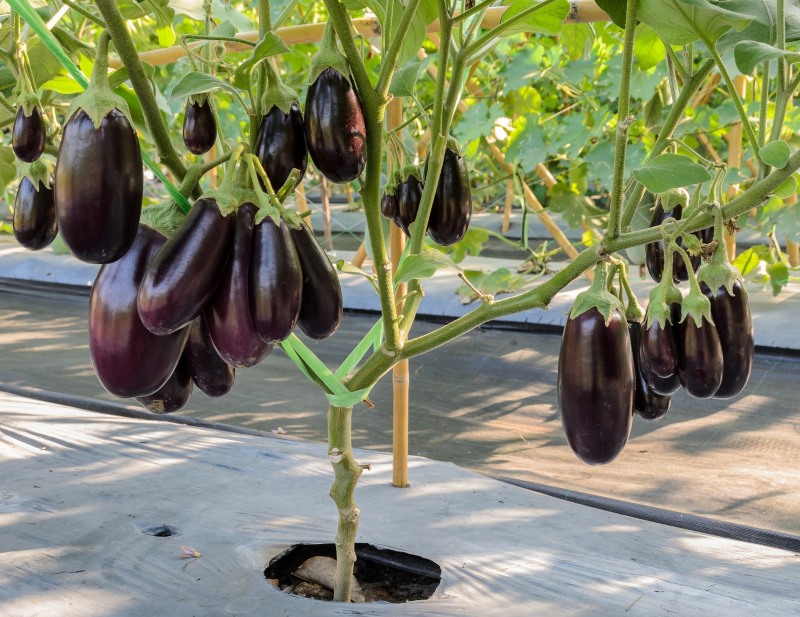
How Eggplant Grows
Eggplant does well in warm climates.
It can flourish in most soils, but it’s best when grown in rich, well-drained, slightly alkaline soil.
About five months of warm weather is needed for it to bear fruit.
The best temperature for the plant to thrive is between 70 and 85 degrees Fahrenheit.
When temperatures reach 95 degrees Fahrenheit, fruit production ceases, and leaves tend to fall.
Cold weather has a similar effect, so it’s best to avoid planting when temperatures are expected to be below 60 degrees Fahrenheit or exceed 95 degrees Fahrenheit.
Farmers generally start planting in March.
Eggplant does best with consistent soil moisture, but it can also survive dry spells once the plant is properly established.
If you want to avoid flower and fruit drop, regular watering is advised.
Eggplant is edible once it reaches one-third its full size.
Harvesting before eggplant reaches two-thirds of its full maturity is common practice since as with other plants, regular harvesting boosts fruit production.
Another reason to harvest eggplant a bit early is that the older the plant, the more bitter it is likely to become.
Accordingly, it’s recommended that you harvest and eat eggplant before it’s fully mature.
Even if you have some overripe eggplant, you can save it for its seeds. (5)
Interesting Facts
- While widely considered a vegetable, eggplant is actually a berry.
- Eggplant is related to tomatoes They’re both parts of the nightshade (Solanaceae) family.
- Eggplant is believed to have originated in India, where it is still considered the king of vegetables and is important in Indian diets.
- In Renaissance Italy, it was called mala insane or “crazy apple.” (6)
- There’s even a Japanese proverb about eggplant: “If you see Mt. Fuji, a hawk, and an eggplant on New Year’s Day, you will be forever blessed.”
- Eggplant is a perennial plant, which means it has a life span of more than two years.
- Eggplant also has the highest concentration of nicotine among vegetables, which isn’t particularly surprising since tobacco is also part of the nightshade family. Nicotine does not directly cause cancer or other ailments, having about the same effect on the body as caffeine. (7)
- Salting and rinsing eggplant can remove the plant’s bitterness. Today, eggplant is not as bitter as it used to be, but this practice is still useful. Salting will, however, reduce the amount of oil absorbed during cooking.
- An eggplant is more than 90% water. This high water content means it has very few calories. In fact, 100 grams of raw eggplant will contain only 24 calories, along with 14% of your daily fiber needs! (9)
- China is the biggest eggplant producer in the world, having produced about 28,800,000 tons of it in 2012 (10).
Nutrition Facts
Here’s a list of the nutritional components of eggplant both raw and cooked.
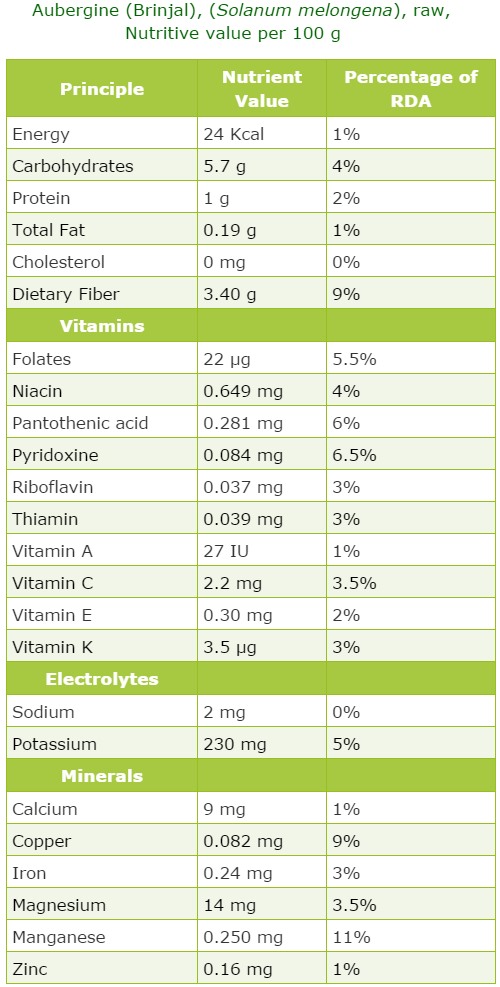
(Source: USDA National Nutrient database)
Eggplant is mainly known for its high antioxidant content, which provides a wide variety of health benefits.
The percentages below are according to a recommended daily diet of 2,000 calories.
About 90% of eggplant is just water, and the calorie content is so low that even if you ate a whole kilo of boiled eggplant, you would be consuming just 350 calories.
To put this into perspective, consider potato chips: 100 grams of potato chips would give you 536 added calories.
Health Benefits of Eggplant
Eggplant and Heart Health
Eggplant contains fiber, potassium, vitamin C, and vitamin B6, all of which are linked to a lower risk of mortality from heart disease.
Consuming these nutrients even in small quantities has proven to be beneficial to human health.
Several studies have shown that these nutrients lead to lower rates of heart disease.
One study, in particular, proved that people who consume vegetables containing these nutrients have a 34% less chance of contracting heart diseases than those who do not.
Eggplant contains a reasonable amount of vitamin K, which is essential for blood clotting.
It also helps prevent calcification of the arteries, thus preventing dangerous plaque deposits that may clog the heart (13, 14).
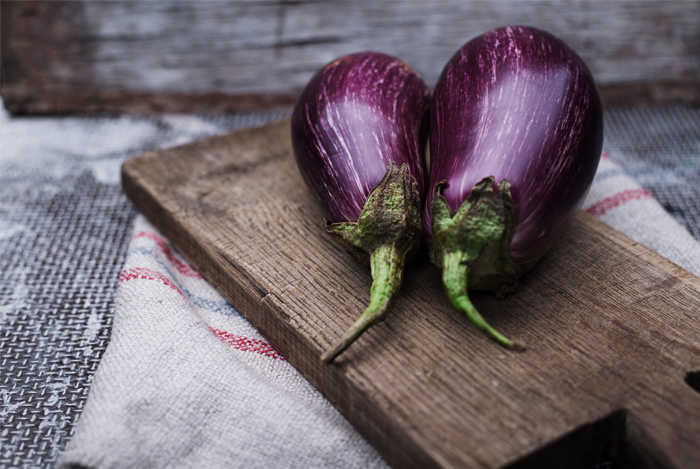
Eggplant and Blood Pressure
One clinical study indicated that an increased intake of anthocyanins, which are red-blue flavonoid plant pigments bursting with antioxidants, leads to a significant drop in blood pressure.
This drop in hypertension leads to a lower risk of stroke, heart attack, and blood clots.
Vitamin E in eggplant is also known for treating and preventing various diseases related to the heart and blood vessels, such as chest pain, high blood pressure, and blocked or hardened arteries. (15, 16, 17, 18, 19)
Eggplant and Blood Cholesterol
Cholesterol is a naturally occurring substance produced by the liver that is needed for the proper function of cells, nerves, and hormones.
When cholesterol levels are balanced, everything is fine and healthy, but when cholesterol is oxidized, it becomes dangerous.
Eggplant has antioxidants that balance your blood cholesterol levels by preventing cholesterol oxidation.
For example, vitamin E serves as a protective antioxidant that can fight cholesterol oxidation.
A research study was conducted on animals regarding the effects of eggplant on blood cholesterol levels.
It showed that rabbits with high cholesterol that consumed eggplant juice had a significant decrease in weight, along with blood cholesterol levels.
Lab tests have shown that eggplant contains substantial amounts of chlorogenic acid, which is one of the most powerful free radical scavengers found in plants.
It has been shown to decrease LDL levels and has antimicrobial, antiviral, and anticarcinogenic properties. (21, 22, 23, 25,)
Eggplant and Cancer
Eggplant contains polyphenols, which have anticancer properties.
The anthocyanins and chlorogenic acid in eggplant work as antioxidants, fighting inflammation and oxidative stress-related damage in the body.
They are known to prevent tumor growth and stop the invasion and spread of cancer cells.
They also stimulate the detoxification of enzymes within cells and promote the death of cancerous cells.
By fighting cancerous cells and keeping your cells and tissues healthy, it helps in preventing cancer as well as in countering very early-stage cancer.
According to data from a study conducted at the University of York, vitamin A intake proved to be very promising in treating different types of cancer, thanks to the vitamin’s ability to control malignant cells in the body.
Lung, prostate, breast, ovarian, bladder, oral, and skin cancer could be suppressed by retinoic acid (Vitamin A). (26, 28)
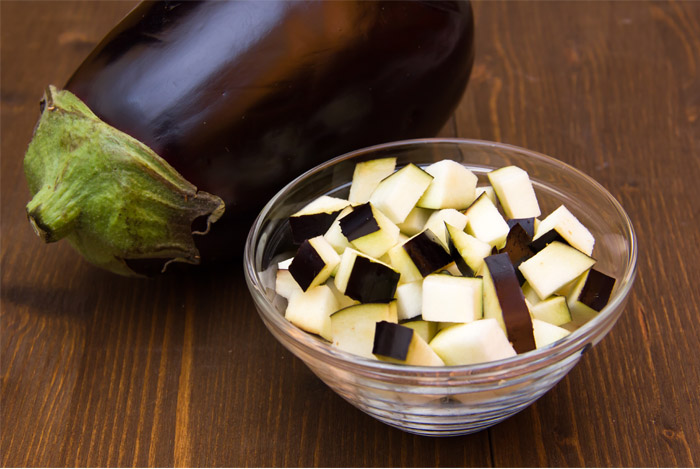
Eggplant and Cognitive Function
Findings from studies conducted on animals show that nasunin, an anthocyanin within eggplant skin, is another strong antioxidant that protects brain cells from free racial damage.
It has also been proven to help in the facilitation of nutrients in the cell and the disposal of cell waste.
More research suggests that anthocyanins inhibit neuroinflammation and increase blood flow to the brain, thus helping prevent mental disorders related to age and improving memory.
Research also strongly suggests that nasunin actively works to reduce oxidative stress in the body. (31, 32, 33, 34, 35)
Eggplant and Dietary Fiber
Dietary fiber is a widely recognized component of a healthy, balanced, and nutritional diet, and eggplant is a great source of dietary fiber (100 grams of raw eggplant has 14% of your daily fiber requirements).
Clinical studies show that fiber has a wide range of benefits for human health.
Fiber is essential for gastrointestinal health as well as regular bowel movements.
It stimulates the secretion of gastric juices that help in the absorption of nutrients and processing food.
Fiber also leads to a reduction in heart disease, since it helps in removing some of the “bad” cholesterol that clogs up the arteries of the heart.
Fiber helps improve bowel function, gut health, the body’s immune system, and controls your blood glucose and serum lipid levels, all while making sure your intestines and colon are in good health. (36, 37)

Eggplant and Weight Loss
Eggplant contains almost no fat, no cholesterol, and few calories.
Adding eggplant to your diet is a great choice if you are trying to lose weight or combat obesity.
The high fiber content inhibits the release of a hormone called ghrelin, which tells our brain that we are hungry again.
Fiber also helps suppress and prevent colon cancer. (38, 39)
Eggplant and Bone Health
Eggplant is very good for people who are at high risk for bone degradation and osteoporosis.
Phenolic compounds present in eggplant are what give them their color, and these compounds have been linked to reduced signs of osteoporosis, stronger bones, and increased bone mineral density.
The nutrition chart above will show you that eggplant also has significant amounts of iron, manganese, and calcium, all of which are integral if you want to maintain strong bones.
Eggplant also has vitamin K, which improves bone density, overall health, and reduces the risk of bone fractures, especially in postmenopausal women who are at risk for osteoporosis.
Consuming enough vitamin K can help prevent sprained ankles and even help broken bones.
All in all, eggplant is effective in preventing osteoporosis and boosting overall bone health. (40, 41, 42, 43, 44)
Eggplant and Anemia
Anemia, which results from a lack of iron in the diet, is a very troubling disease.
It can lead to headaches, migraines, fatigue, weakness, depression, and even cognitive degeneration.
Thankfully, the absorption and daily intake of iron can effectively curb and prevent this disease.
Eggplant has a decent amount of iron, which helps combat anemia.
Since eggplant is also rich in copper, which is an essential component to produce red blood cells, you can see your hemoglobin count progress to the right side of average.
Copper is also necessary for the proper utilization of iron and oxygen in the blood.
Thiamin also helps in the production of red blood corpuscles in the body.
Vitamin B2 (riboflavin) found in a small amount in eggplant is a known agent used for treating and even preventing anemia.
It’s required for steroid hormone synthesis and red blood cell production.
It’s also another compound that helps in the transportation and mobilization of iron in the body. (45, 46, 47)
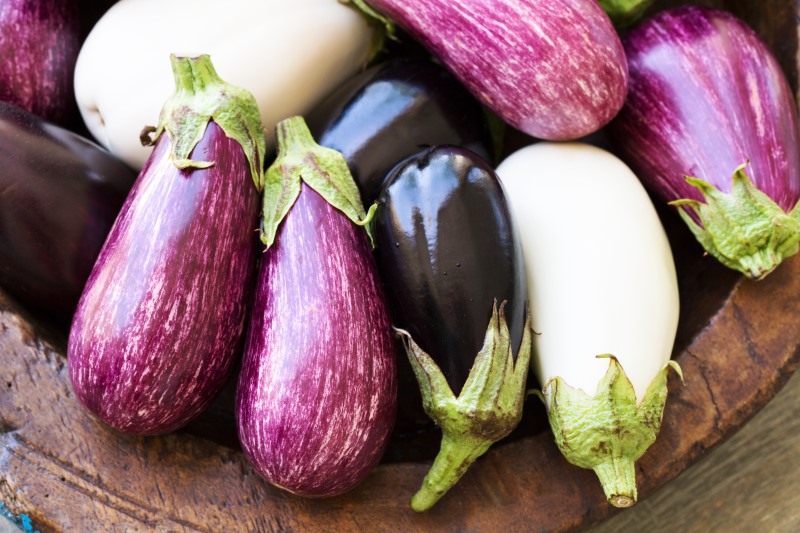
Eggplant and Diabetes Management
Combine eggplant’s high fiber content with its low amount of soluble carbohydrates and you have an ideal food for managing diabetes.
These qualities make it an effective regulator of glucose and insulin activity of the body.
When the insulin levels of the body are stable and there aren’t any drastic changes in blood sugar levels, the symptoms of diabetes can be effectively managed.
Magnesium is also known to effectively reduce the symptoms of diabetes. (48, 49)
Eggplant and Pregnancy
Folates are integral to any diet, and they are particularly beneficial for pregnant women.
Folates help protect infants from neural tube defects, which can manifest themselves in a number of different ways.
So a little extra eggplant is always good for women who are expecting and also great for the health of the developing fetus. (49, 50)
Eggplant and Bioflavonoids
Several studies have shown that the bioflavonoids present in eggplant are able to control high blood pressure and relieve stress.
Some might argue that lowering your blood pressure automatically reduces mental stress, but that is not the case here.
Eggplant can calm you down and help relieve tension. (51, 52)
Eggplant and Ultraviolet Radiation
Ultraviolet radiation is known to cause sunburn, wrinkles, lower immunity, premature aging, and even cancer, which is why protecting yourself from harmful UV rays is important.
Such antioxidants as vitamin C, vitamin E, flavonoids, and phenolic acids, help fight free radicals that are the main causative agents of negative skin changes.
Studies have shown that polyphenols ameliorate adverse skin reactions following UV exposure.
These plant compounds help protect the skin, keeping your skin healthy and disease free. (55, 56)
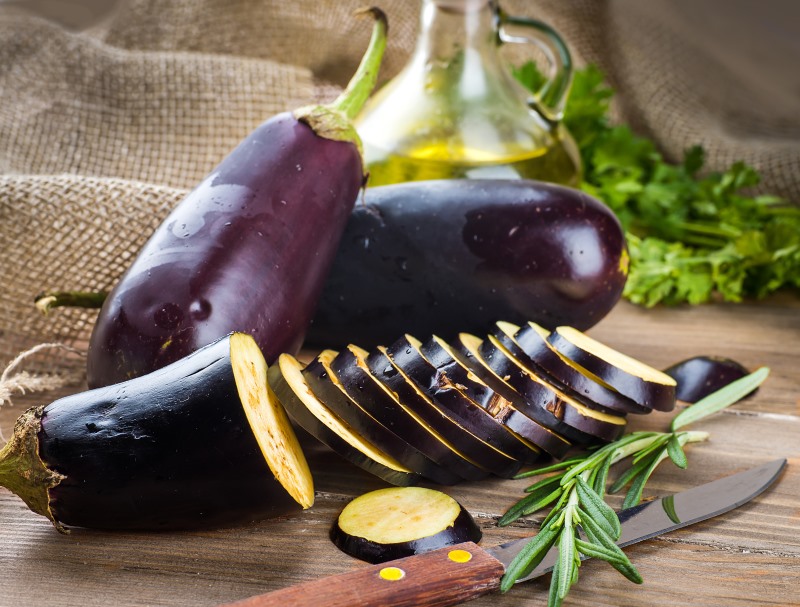
Eggplant and Eye Function
During the past two decades, many studies and research have been conducted to investigate the diverse protective effects displayed by polyphenolics present in various fruits and vegetables.
These studies have concluded that anthocyanins and anthocyanin-rich extracts help to improve eye function and vision.
These compounds (which are found in a significant amount in eggplant) are linked to healthier eyes and even show protective properties for your vision and general eye health.
The chemical niacin present in eggplant has also been shown to be extremely effective at preventing cataracts.
Eggplant has also been documented to be able to reduce intraocular pressure in the eyes and alleviate pressure symptoms.
Eggplant has a healthy amount of vitamin A, which is great for healthier eyes.
They’ve been found to improve healing and vision in people undergoing eye surgery. (58)
Eggplant and Allergies
Chlorogenic acid present in eggplant is also effective in reducing allergic symptoms and minimizing the effects that allergies might cause.
A study was conducted on mice, which proved this to be a conclusive effect of chlorogenic acid.
Vitamin A intake also lowers the risk of certain types of food allergies by boosting the immune system. (60)
Eggplant and Antimutagenic Properties
Using a Japanese eggplant as a test subject, the fruit’s extracts were taken under the microscope and investigated.
It turns out that eggplant has antimutagenic properties, which helps prevent cell mutation.
Antimutagens are also important in tumor prevention, suppression, and lower proliferation and unwanted growth rates. (61)

Eggplant and Skin Health
The niacin in eggplant is absolutely amazing at reducing, treating, and preventing acne and other skin conditions.
If you’re looking for healthy, smooth skin instead of skin that is pimply and discolored, this might be the answer.
Niacin displays anti-inflammation and irritation properties and is also effective and prompt in treating inflammatory skin diseases.
Vitamin A is also known to be effective in fighting skin cancer and improving overall skin health.
It supports epithelial skin tissues and is considered a powerful aid in the battle against skin cancer, acne, and wrinkles.
The vitamin E in eggplant is a natural antiaging nutrient.
It strengthens the capillary walls in your skin and helps improve moisture and elasticity.
It helps reduce inflammation both within your body and on your skin, giving your skin a healthy, smooth, and youthful luster.
It’s also great for decreasing signs of acne and eczema.
Another wonderful feature is that it promotes cell regeneration.
You can use it to treat scars, acne, and wrinkles. (62, 64)
Eggplant and Headaches
Niacin and vitamin B3 are widely used for treating headaches, ranging from mild to severe migraines.
These compounds are known agents used in treating dizziness, too, as well as suppress motion sickness symptoms, and some people even use eggplant to prevent premenstrual headaches.
Vitamin B2 is also a proven method that has stood the test of time for dealing with painful and serious migraine attacks. (65, 66, 67)
Eggplant and Depression
Serotonin is a chemical thought to cause an imbalance in moods, which can lead to depression, but eggplant contains a compound called scopoletin that essentially serves to regulate serotonin levels in the brain, which effectively reduces the feeling of anxiety and other symptoms of depression.
The vitamin B group improves the body’s ability to withstand stress, which is why they’re often called “antistress” vitamins.
Thiamin is also needed to give your mood a boost and fight against depression and anxiety. (59)
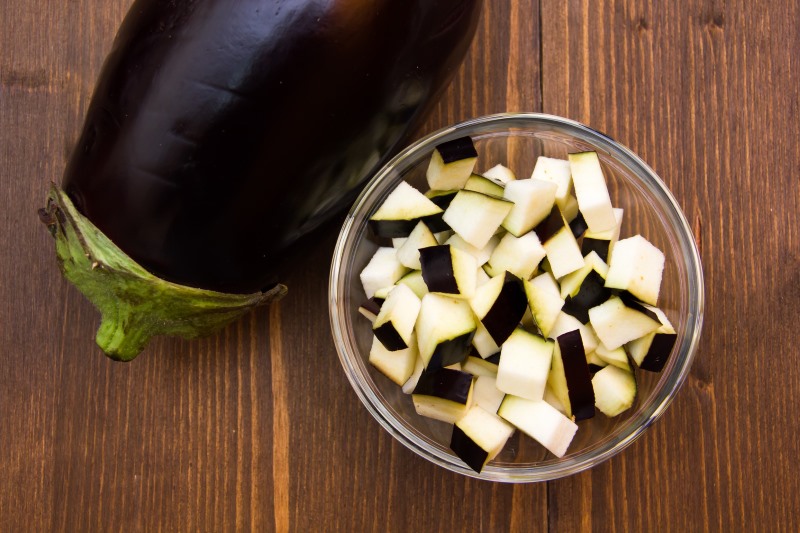
Eggplant and Brain Health
Nasunin is a potent phytonutrient and antioxidant found in eggplant.
As free radicals destroy cells and cellular DNA, nasunin may help slow the aging process and promote efficient brain function.
Free radicals cause oxidative stress, which is certainly bad for you.
It can damage your cells and is linked with the development of cancer, Alzheimer’s disease, and Parkinson’s disease.
Eggplant has antioxidants that show anti-inflammatory properties that protect your brain from the oxidative stress caused by these free radicals.
Vitamin E could possibly slow down the worsening of memory loss and functional decline in people suffering from moderately severe Alzheimer’s disease.
Also, vitamin E, when taken along with vitamin C, can also decrease the risk of developing several forms of dementia. (61, 62)
Eggplant and Blood Circulation
Nasunin also helps prevent peroxidation of cholesterol in the blood.
This helps eliminate the buildup of plaque and other substances in the blood vessels, keeping the heart and the entire cardiovascular system healthy by relaxing blood vessels and increasing blood flow.
Vitamin E is also known to promote blood circulation, strengthen your capillary walls, and nourish your cells, which improves your physical endurance.
A study found that vitamin E can increase your energy level and decrease the level of oxidative stress on your muscles after you exercise.
This allows you to improve muscle strength and eliminate fatigue. (63)
Eggplant and Chelation
Chelation is the process of removing metals or toxins from the body.
Partly due to the antioxidant activity of nasunin, it acts as an iron chelator.
People with excessive iron in their system can use it as a natural way to reduce the iron content of their blood.
It should be noted, however, that people suffering from anemia, especially during menstruation, should be careful when eating eggplant.

Eggplant and Healthy Teeth and Gums
Vitamin C is so good at taking care of your teeth and gums that it has even been referred to as the “invisible toothbrush.”
It’s one of the best natural defenses against bacteria and is quintessential for proper teeth and gum health.
Daily brushing and flossing simply aren’t enough to avoid gum disease.
Just a small amount of vitamin C in your diet will prevent deficiency diseases, such as scurvy. (66)
Eggplant and Immunity
Everybody knows that vitamins are essential for the proper functioning of the body’s immune system.
It’s been known for a long time that vitamin C is vitally important for boosting your body’s ability to fight off colds and viruses.
Recent studies have also shown that vitamin C may reduce the effects of colds and flu, along with preventing the development of further complications, such as pneumonia and lung infections.
Vitamin A is another important constituent of a healthy diet.
In fact, it’s one of the most important vitamins regarding immunity.
Genes involved in immune responses are regulated by vitamin A, which makes it essential for fighting serious autoimmune diseases, such as cancer, but it is also important for less severe illnesses, such as the common cold or flu.
It’s especially important for children.
Studies have concluded that vitamin A deficiency in children increases their vulnerability to such infections as diarrhea and measles.
The study gave vitamin A supplements to 100,000 children who weren’t typically taking anything.
The study found conclusive evidence that there was an estimated saving in medical costs of $340,306,917 due to the number of events involving diarrhea that were reduced with the supplementation.
Studies have shown that vitamin E can also significantly increase immunity, therefore helping to prevent both common illnesses and preventing serious conditions from forming in the first place. (67, 68, 69, 70, 71, 72)
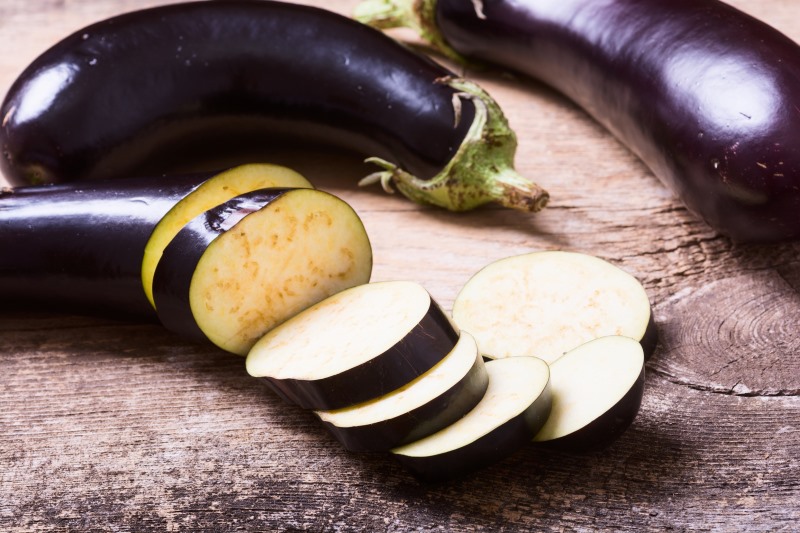
Eggplant and Hair
The vitamin E and vitamin A in eggplant along with powerful antioxidants help minimize environmental damage to your hair.
They can even promote circulation to your scalp.
Vitamins A, E, K, C, B6, thiamine, riboflavin, niacin, pantothenic acid, and folate are some of the essential nutrients needed for proper hair growth.
One study showed that these vitamins were pretty effective at treating certain types of hair loss conditions.
Riboflavin also helps maintain your collagen level.
This substance makes up healthy skin and hair.
Collagen is required for the maintenance of the youthful structure of the skin and prevents lines and wrinkles, along with giving your hair a youthful luster. (74)
Eggplant and Menstrual Health
Every month women experience discomfort associated with their menstrual cycle, whether it’s from cramps, hormonal imbalance, or simply PMS.
While this discomfort cannot be completely avoided, you can diminish severity.
Eggplant contains a lot of nutrients that can effectively help you combat these symptoms if it’s something you have to deal with every month.
Vitamin K regulates your hormones so that you don’t experience cramps and other pains of menstruation.
It helps in blood clotting, which helps control excessive bleeding, further alleviating cramps.
One study showed that when injected into the bloodstream vitamin K can relieve acute menstrual pain.
Calcium is also effective in reducing PMS symptoms, such as cramps, bloating, breast tenderness, muscle aches, headaches, and moodiness.
Vitamin E helps reduce the cramping, anxiety, and cravings that are associated with PMS.
It also decreases the severity and duration of pain and balances your hormones to regulate your menstrual cycle. (75, 76, 78)
Eggplant and Healthy Metabolism
Eggplant is rich in vitamin B.
Thiamin (also known as vitamin B1) is needed to make adenosine triphosphate (ATP), which is the body’s main energy-carrying molecule.
Thiamine also helps convert carbohydrates into glucose, which is something your body needs to keep your metabolism running smoothly.
Thiamin is also known to help in the breakdown of proteins and fats.
It also helps produce red blood cells, which in turn boosts energy levels.
In fact, the entire B complex nutrients are known for their energy-boosting properties and for promoting a healthy metabolism. (79)
How to Buy and Store Eggplant
The health benefits mentioned above should lead you to consider adding eggplant to your daily diet.
When you buy eggplant, try to choose those that are firm and feel somewhat heavy for their size.
It’s best to avoid any that are bruised, withered, or discolored.
A good eggplant has smooth, glossy skin, with an intense purple hue.
If it’s squishy and deformed, avoid it.
Try searching for ripe eggplant.
To check for ripeness, lightly press a finger against the skin; if your finger leaves an imprint, the eggplant is ripe.
Smaller eggplant usually tends to be sweeter and have fewer seeds, so choose according to your needs and tastes.
It’s best to look for eggplant that has a green stem.
While ripeness is something to look for, remember that overripe and mushy eggplant isn’t good for the dinner table.
How do you store eggplant? It will likely last longer if stored at room temperature.
You cannot store them for weeks on end, so avoid bulk purchases.
They grow year-round, so there’s always plenty available. (80)
Find a cool, shady spot away from direct sunlight.
You can store it in a vented bowl, but avoid sealing it inside plastic bags, as that just helps speed the decaying process.
Eggplant is sensitive to temperature, so you should avoid storing it in both high and low temperatures, which is why unlike most vegetables, refrigeration is not suitable.
Cold temperatures lead to chilling injuries, including pitting, surface bronzing, and browning of seeds and pulp tissue. (81)
Eggplant is also highly sensitive to ethylene, a natural gas that causes certain foods to ripen (and eventually spoil) very quickly.
Avoid keeping eggplant close to bananas, tomatoes, and watermelons, all of which are high ethylene producers.
If you insist on storing it in the fridge, limit the duration to about three days, and use it up quickly after you take it out.
If you store eggplant for more than five days, it might turn bitter.
How to Add More Eggplant into Your Diet
If you’ve never prepared eggplant before, here are some suggestions.
When you’re cutting eggplant, always use a stainless steel knife, as carbon steel will react with the phytonutrients present and cause it to turn black.
You can choose to remove the eggplant skin, but most of the eggplant’s nutrients are actually found in the skin.
As the eggplant ages, the skin becomes more and more inedible.
Younger eggplant skin has the most nutrients and is a great source of nutrition, but you should peel off the skin in older eggplant before eating it.
Do not fry it.
Eggplant does taste great when it’s fried, but it absorbs fat at an alarming rate.
Studies have shown that eggplant will absorb eighty grams of fat in approximately seventy seconds.
Frying actually adds about seven hundred calories.
Eggplant can be baked, roasted, or steamed.
If you’re baking it whole, you should pierce it several times with a fork to allow steam to escape.
Baking can be done at 350 degrees Fahrenheit for about fifteen to twenty-five minutes.
Baking time, though, really just depends on the size of the eggplant, so use your discretion.
You can test to see if it’s properly cooked by inserting a knife or a fork and observe whether it passes through easily or not.
Shown below are some well-known recipes using eggplant.
Simple Recipes
Stuffed Eggplant
You will need the following ingredients to prepare this dish:
- 4 to 8 eggplants
- 1/2 lb (227g) ground beef
- Bunch fresh parsley
- Tomatoes
- 1 small onion
- Garlic Cloves
- 7 tbsp vegetable oil
- 1 tbsp tomato paste
- Stew seasoning (advieh)
- Ground chili pepper, salt
First, fry the diced onion with 2 tbsp vegetable oil in a pot until translucent.
Then add sliced garlic to the fried onions.
Add stew seasoning (advieh) and ground chili pepper and stir.
Add ground beef and continue frying until the beef becomes brown.
Then add tomato paste and salt, and stir well.
Add the minced parsley to the pot; continue heating for a few more minutes.
In a separate pot, add 3 tbsp vegetable oil, cut each eggplant halfway, and fry.
Take a bigger pot, add 2 tbsp vegetable oil, and lay half of the sliced tomatoes on the bottom of the pot.
Warning: Allow the eggplants and beef mixture to cool down before moving on to the next step.
Fill eggplants with the beef mixture and seal with wooden toothpicks.
Lay the eggplants on top of the tomato layer.
Lay the rest of the sliced tomato on top of the eggplants.
Cover the pot with a lid.
Simmer for ten minutes over medium heat.
Baingan Bharta (Eggplant Curry)
Ingredients required to prepare this dish:
- 1 large eggplant (roasted)
- 1 med/lg onion (chopped
- 3–4 cloves garlic (finely chopped)
- 1 hot pepper (finely chopped)
- 1 14-oz can diced tomatoes (or 2 fresh tomatoes)
- 1 cup rough chopped cilantro (coriander leaves)
- 1 tsp mustard seeds
- 1 tsp cumin seeds
- 1 tsp coriander powder
- ½ tsp turmeric
- ½ tsp garam masala
- 5–6 tbsp olive oil
Slice the eggplant lengthwise down the middle into two halves, brush all surfaces with olive oil, place on a baking pan flat side down, and bake at 400 degrees F for 30 minutes.
Remove from oven.
The eggplant will be very hot, so set aside to cool.
In a skillet, heat olive oil on medium-high heat.
Add mustard and cumin seeds and cook 20–30 seconds—not too long or they will overcook.
A pinch of asafetida can be added as well if desired.
When cumin seeds begin to open, add onions and sauté for a couple of minutes.
Add garlic and hot pepper and continue sautéing.
Add coriander and turmeric powder and mix well.
I like to go light on the spices, but feel free to add more if desired.
If you like a spicier dish, add 1 tsp of chili powder.
I take it easy on the spices to avoid overpowering the flavor of the eggplant.
Add salt to taste and continue cooking a couple of more minutes.
Stir in tomatoes, reduce heat, and simmer 4–5 minutes.
While tomatoes simmer, return to the eggplant.
At this point, the roasted eggplant will be much easier to handle (although it may still be hot, so be careful).
Using a spoon, the meat of the eggplant can be easily scooped away from the skin.
Discard the skin.
Roughly chop the eggplant, and add to the skillet, mixing well with the tomato mixture.
Cook for 3–4 minutes, and then add garam masala.
Mix and continue cooking another couple of minutes.
Add 1 cup of chopped cilantro (coriander leaves).
Mix and remove from heat.
Crispy Fingers – Eggplant
Ingredients:
- Eggplant (brinjals) 2 n
- Egg 1 n
- Oregano ½ ts
- Salt
- Chili flakes 1 ts
- Rice flour 4 tb
- Bread crumbs 4 tb
First, cut the eggplant into finger-size strips and keep it in the water.
Take a bowl, add egg, some oregano, salt, and chili flakes.
Then add rice flour and salt.
Roll eggplant strips in the rice flour, and dip into the egg mixture.
Again roll eggplant in rice flour and dip in the egg mixture.
Roll in bread crumb mixture, and then deep fry them.
This is so simple and takes no time to prepare.
Serve with tomato sauce for flavor.
Eggplant/ Brinjal Curry
Ingredients:
- Baby eggplant 200 g
- Onions 1 n
- Salt
- Ginger garlic paste 1 ts
- Turmeric ¼ ts
- Tomatoes 2 n
- Coconut (grated) 2 tb
- Chili powder 1 tb
- Coriander powder 1 tb
- Oil for fry
- Mustard seeds ¼ ts
- Fenugreek seeds ¼ ts
- Red chili 4 n
- Urad daal ½ ts
- Curry leaves 2 sp
- Tamarind juice ¼ cup
- Jaggery 1 small piece
Heat oil in a pan, and add onions, salt, and sauté for 2 minutes.
Then add ginger garlic paste, turmeric, tomatoes, grated coconut, chili powder, and coriander powder.
Put the lid on and let it cook for 2 minutes.
After you take it off the heat and let it cool down, put it into the blender and make a paste.
Heat oil in a pan, adding mustard seeds, fenugreek seeds, red chili, urad daal (optional), curry leaves, and add the prepared paste of onion, tomato, and coconut.
Mix this, put the lid on, and let it cook for 5 to 6 minutes.
Add tamarind juice and water, mix it, and then add jaggery.
Once it comes to a boil, add fried baby eggplant, salt, mix it well, and cook this for a few minutes.
Then switch off the flame.
You can serve this with rice or roti.
Sicilian Caponata
Ingredients:
- 1 large eggplant
- 1 large sliced onion
- 3–4 stalks of celery, diced
- 3–4 plum tomatoes (or a small can)
- 1 small jar of capers (rinsed twice to remove salt)
- 1/4 cup of diced black olives
- 2 tbsp sugar
- 4 tbsp wine vinegar
- Olive oil for frying
- Kosher salt/fresh ground pepper to taste
Dice the eggplant into small cubes, and fry in hot oil for about 10 minutes or until it becomes soft and slightly browned, and then remove from heat.
Fry the onions in the same oil; when they become golden brown, add celery and tomatoes.
Let it simmer for 15 minutes.
Add capers and olives.
Add the eggplant to this mixture.
In a microwavable bowl, add sugar to vinegar, and salt and pepper.
Heat 30 seconds in a microwave, and add this heated mixture to the eggplant.
Cover and simmer for about 20 minutes, and stir occasionally.
Precautions
Eggplant can sometimes be bitter.
While this is usually due to age or poor storage conditions, it is something you may face.
The best and easiest way to stop this from being a problem is by salting and rinsing the eggplant before eating.
Eggplant also contains a substance called oxalates, which some studies have linked to the formation of kidney stones, which can lead to acute oxalate nephropathy or even death.
When oxalates become too concentrated in body fluids, they can crystallize and result in the formation of kidney stones.
It is generally advised that people suffering from kidney stones or those who are prone to getting kidney stones limit their intake of foods with oxalates.
Eggplant should be taken as a side dish due to its nutritional value.
Since it doesn’t have many calories, you can easily add it to your diet.
Baked/stuffed eggplant is great for helping you lose weight, but eggplant absorbs fat at an alarming rate when fried, which negates the entire point of eating it in the first place.
Another reminder is that eggplant is very perishable.
Try to eat it as soon as possible after purchase (88).
Conclusion
When a plant is considered to be the king of vegetables in one of the most densely populated countries in the world, it must be good.
Its nutritional value and health benefits are often overlooked, but if something is nutritional, balanced, and great for your overall health, then it won’t be overlooked for long.
Bon appétit!
FDA Compliance
The information on this website has not been evaluated by the Food & Drug Administration or any other medical body. We do not aim to diagnose, treat, cure or prevent any illness or disease. Information is shared for educational purposes only. You must consult your doctor before acting on any content on this website, especially if you are pregnant, nursing, taking medication, or have a medical condition.
HOW WOULD YOU RATE THIS ARTICLE?







I simply love eggplants but IS IT REALLY TRUE that it controls diabetes??? WOW…
Hello Gloria! Yes, eggplants can be very beneficial for people with diabetes 🙂 Nevertheless, it doesn’t mean that only eggplants can help manage this condition, they’re just very useful to maintain glucose levels.
Is it allowed to give eggplant to toddlers?
Hi
Thanks for the wonderful info. I would like to know if it can be eaten raw.
Sam
Hello Sam, in fact, you can eat eggplant raw 🙂
Helen, Thank you for providing such a great article. I’ve recently been learning about egg-plants and think you hit the benefits spot on!
Do you have any more recipes?
Thanks for sharing, i really like eating egg plant and now it has some health benefits to..
I love eggplant, but don’t care that it’s always served with pasta. It’s funny how appetites change, isn’t it? Now
I order & ask to substitute a few pieces of eggplant instead of the pasta.
Is there a recipe for the pic of eggplant with fresh tomatoes & cheese? If not, I’ll make up my own based on picture.
Thank you!
I love eggplant and especially Eggplant Parmesan. I have an iPad with a few cooking apps and found one recipe for slicing up the eggplant and using it at base of mini pizzas. I’ve had it for a two weeks and it’s probably time to throw it away and try again when in the fall.
Thank you for all the useful info.
I am studying your article is very deep knowledge as – History, Interesting facts, Nutrient facts, and health benefits share with us. Thank you, sir, for providing a very good knowledge.